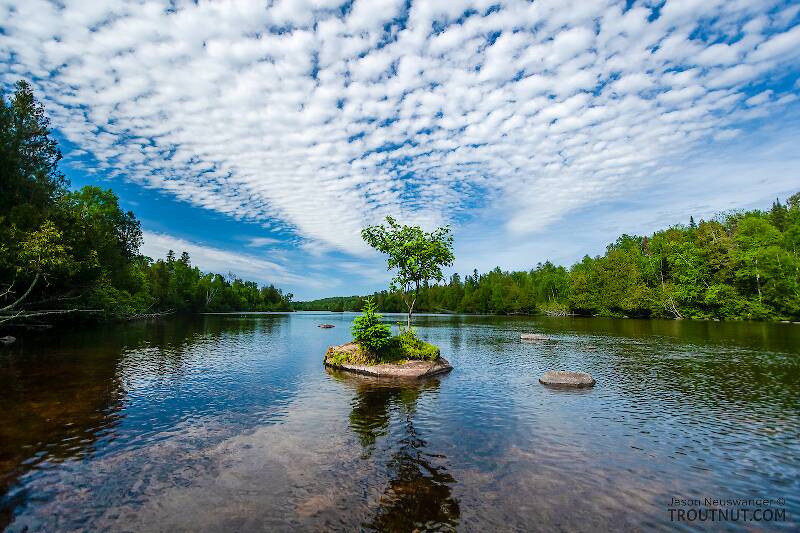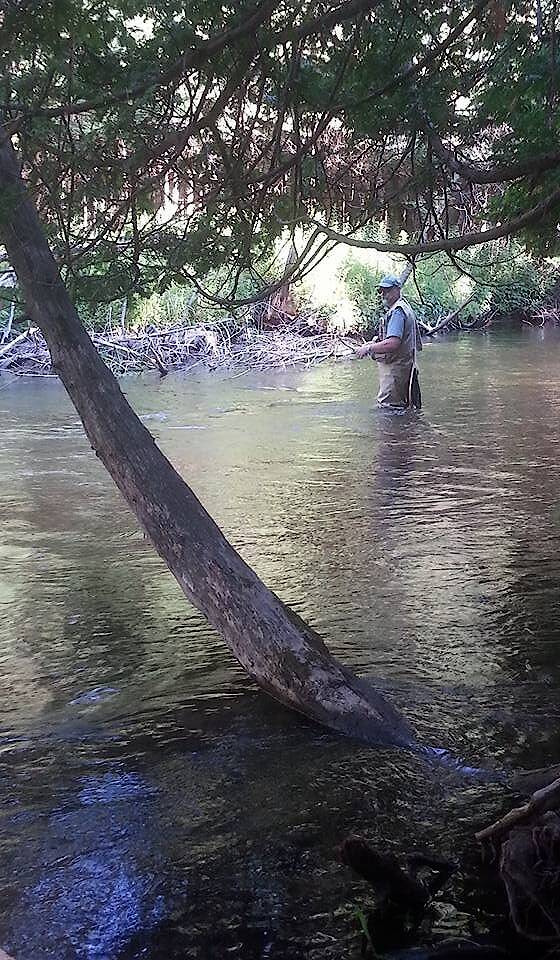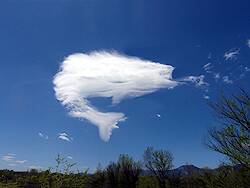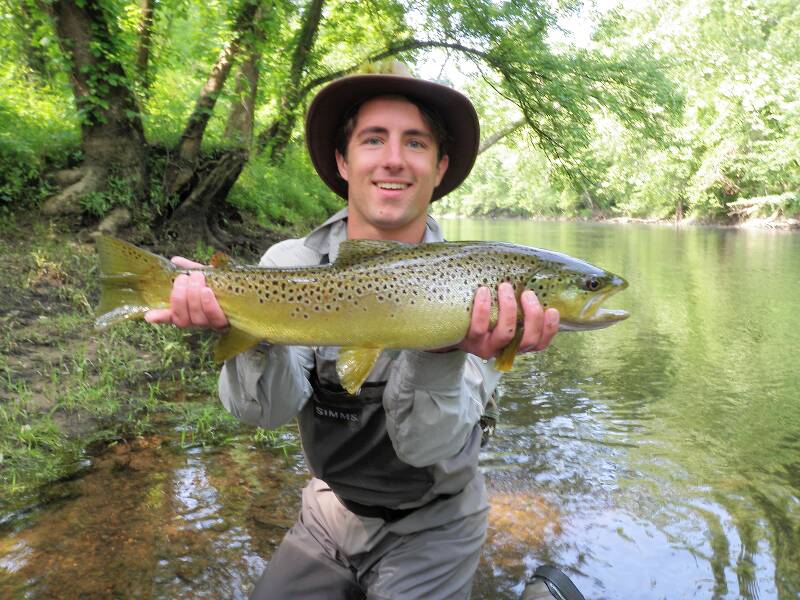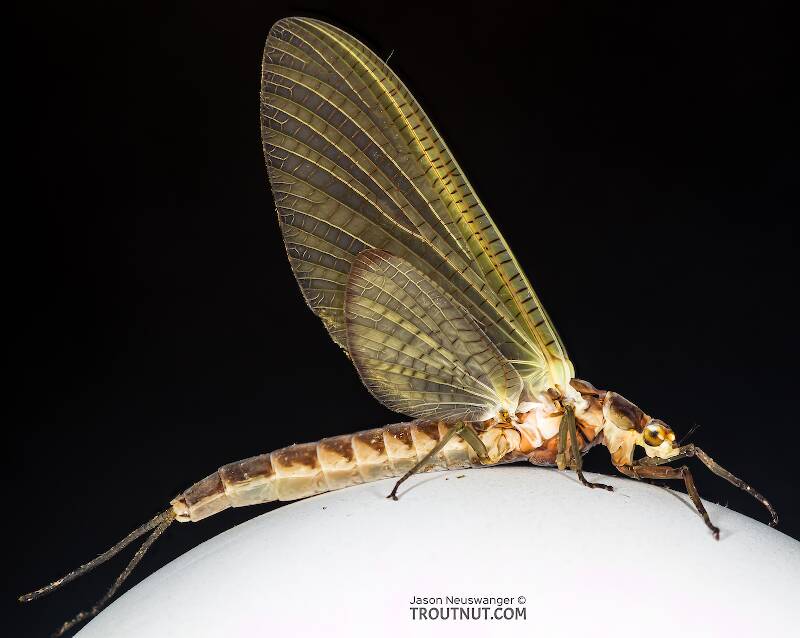
Hex Mayflies
Hexagenia limbata
The famous nocturnal Hex hatch of the Midwest (and a few other lucky locations) stirs to the surface mythically large brown trout that only touch streamers for the rest of the year.
Featured on the forum
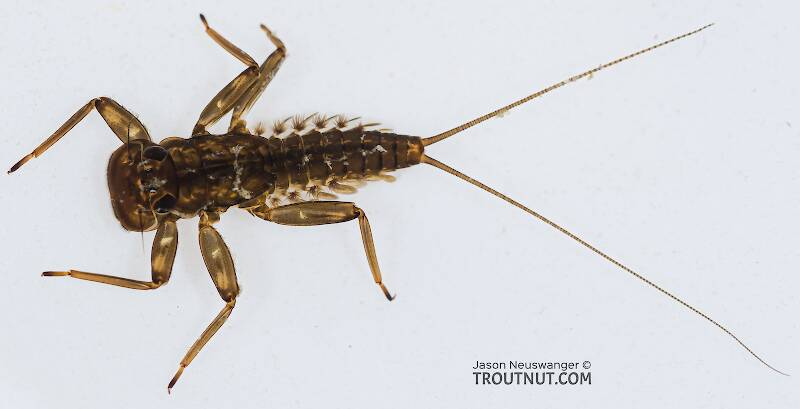
This specimen keys to the Epeorus albertae group of species. Of the five species in that group, the two known in Washington state are Epeorus albertae and Epeorus dulciana. Of the two, albertae has been collected in vastly more locations in Washington than dulciana, suggesting it is far more common. On that basis alone I'm tentatively putting this nymph in albertae, with the large caveat that there's no real information to rule out dulciana.

Troutnut is a project started in 2003 by salmonid ecologist Jason "Troutnut" Neuswanger to help anglers and
fly tyers unabashedly embrace the entomological side of the sport. Learn more about Troutnut or
support the project for an enhanced experience here.
Roguerat on Apr 20, 2013April 20th, 2013, 4:24 am EDT
we've experienced record rain-falls and subsequent flooding of W Michigan rivers the past 2 weeks, as of today I don't plan on getting in a river for the next 2 weeks as well.
does anyone have experience or information for extreme flood-effects on trout? do they just try to hold and survive, get washed downstream, ??
my home stream, the Rogue, is flowing more than 3x it's normal CFS for this time of year, and the Muskegon is way up there too.
The Roguerat
I Peter 5:7 'Cast your cares upon Him..'
does anyone have experience or information for extreme flood-effects on trout? do they just try to hold and survive, get washed downstream, ??
my home stream, the Rogue, is flowing more than 3x it's normal CFS for this time of year, and the Muskegon is way up there too.
The Roguerat
I Peter 5:7 'Cast your cares upon Him..'
The3Ps on Apr 20, 2013April 20th, 2013, 5:02 am EDT
Quite sure they will hunker down and stay put in a deep hole with less current. Some will wash down but will come back just as soon as water levels go down. Not to worry,flood waters are normal and been going on from the beginning of time.
Patience, persistence, presentation!
Sayfu
Posts: 560
Posts: 560
Sayfu on Apr 20, 2013April 20th, 2013, 5:41 am EDT
Here is one that I bantered around, and has been speculated on for sometime now. I discussed it with Bob Jacklin. Why have we had a poor terynarcys californica emergence for a handful of years now? It appears the riparian zone destruction caused by rising waters can have an effect. Authorities out here don't want to attribute it to the extreme raising of the water levels in order to negatively effect rainbow spawning, and protect the cutthroat that spawn about a month later. The water can be say 10,000 cfs, and they bump it up to 23,000 cfs right around the time the big bugs are starting their nymph migration towards the banks. That doesn't effect rivers in Bob's Yellowstone area, but he did mention riparian destruction that are readily evidenced in some of their stretches of river on the Madison.
PaulRoberts on Apr 23, 2013April 23rd, 2013, 9:20 am EDT
MontanaMike on Apr 29, 2013April 29th, 2013, 12:27 pm EDT
The Gallatin and Yellowstone blow out every year and the trout populations stay normal. Its incedible how they can hold to rocks in such turbid currents. I wouldnt worry too much unless it displaces fish in places they could get trapped. However, trout seek out the right temperatures and have a good feel on where they are. With irrigation canals here always rising and drying up, the trout tend to just go with the flow.
Jesse on Apr 29, 2013April 29th, 2013, 6:17 pm EDT
Okay flooding, especially in an extreme fashion such as yours, is both good and bad. It is bad because depending on the spawning fish (im going to go with brown trout), their eggs/babies most likely won't be able to survive that type of water environment. The muddy, high pressuring flows aren't good for young trout. As for larger trout, i have found that it could be a good thing for many reasons. One being that it takes away fishing pressure. Two being that a lot of food is activated such as other smaller fish. Three being that it allows fish to move to areas they normally wouldn't - such as small tributary streams. After flooding you could find fish in very unlikely places, which will most likely keep them stranded until the next high water, movable opportunity. With all this good, however, the bad side (other than effects on young trout), is that flooding is no longer a natural process. Sure rivers come up as they always have, but now instead of natural riparian areas surrounding a stream as they once did, humans have ruined that. Whatever we may be doing upstream will get washed down. Flooding now means chemicals possibly being in the river, along with numerous other negative potentials. So... There is good and bad. Hope that helps.
Most of us fish our whole lives..not knowing its not the fish that we are after.
http://www.filingoflyfishing.com
http://www.filingoflyfishing.com
Quick Reply
Related Discussions
Topic
Replies
Last Reply
0
Jan 21, 2017
by Mcflyangler
by Mcflyangler
4
May 10, 2012
by Shanti
by Shanti

